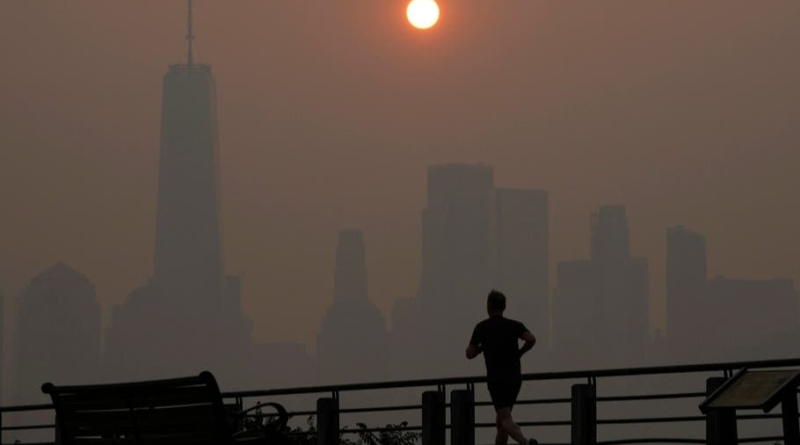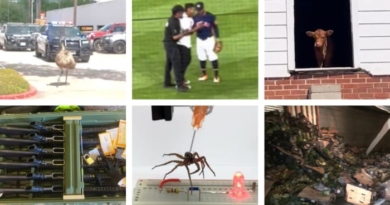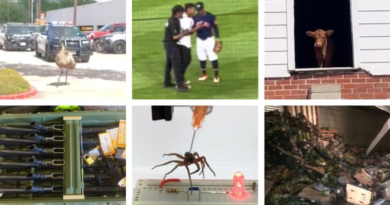Looking Back At Some Of The Headlines That Captivated Us In 2023 – Patch
ACROSS AMERICA — As 2023 slips away, here’s a look back at some of the stories that captivated Patch readers.
This is not an exhaustive list. Notably, because Patch is a local news organization covering communities and neighborhoods across America, we did not include some of the major political stories making headlines in 2023.
On multiple occasions in 2023, cities across the country were enveloped in a dystopian haze as smoke from uncontained Canadian wildfires drifted south. Hazy smoke lingered for days in Chicago in early May, then drifted east to choke cities in Massachusetts and elsewhere in New England. On June 7, New York City had the worst air quality in the world in early June, bringing the city to a smoky standstill.
“I smell smoke,” someone tweeted. “NYC is on fire.”
The situation was similar in Connecticut, New Hampshire, New Jersey, North Virginia and Washington, D.C., Pennsylvania and throughout the Northeast and New England, leading to event cancellations and other closures as officials advised residents to stay inside.
“Here in Clifton, the sky has turned a golden yellow and the smell is terrible,” North Jersey resident John Muller told Patch in early June. “We’re wearing masks inside our home. And with our health issues, this is a bad situation for us … and for thousands of people around our area.”
Air quality worsened again in late June, with forecasts in New York calling for levels ranging from “unhealthy for sensitive groups” to “unhealthy for all” to “very unhealthy” to “hazardous.”
The story was the same in mid-July, when smoke cast an unhealthy pall over cities such as Philadelphia, Minneapolis and others. In early October, the still-burning wildfires triggered air quality alerts in Connecticut, Massachusetts, New Hampshire, Rhode Island and Pennsylvania, among others.
In June, the U.S. Coast Guard led a search for a missing submersible vessel, the Titan, on a tourism expedition to the wreck of the Titanic. The failed attempt at adventure tourism sparked widespread questions about safety, ethics and science.
The OceanGate Expeditions vessel, with five people on board, had an air supply that would last four days. Alarm bells were sounded when the Titan did not surface as expected June 18. “Banging” noises detected underwater a few days later gave hope the occupants would be found alive, but only fleetingly; all five people on board perished, the Coast Guard said June 22.
The search raised questions about the safety of the Titan, which was piloted by OceanGate founder Richard Stockton Rush III, a lifelong adventurer of the sea and sky. The 61-year-old Rush, who became the youngest jet transport-rated pilot in the world at 19, had an aerospace engineering degree and built a Glasair III aircraft and heavily modified a Kittredge K-350 submersible.
Titan, though, drew “unanimous concern” from dozens of industry leaders about potentially catastrophic outcomes. Rush refused to implement recommended safety measures, telling CBS News, “At some point, safety just is pure waste.”
“I mean, if you just want to be safe, don’t get out of bed. Don’t get in your car. Don’t do anything.”
In October, Coast Guard officials said the final remaining Titan submersible debris and evidence, including human remains, had been removed from the North Atlantic Ocean seafloor.
Authorities in Pennsylvania embarked on an intense manhunt for Danelo Cavalcante, a convicted murderer who escaped from custody on Aug. 31 by “crabwalking” up a wall to the roof and somehow making his way through a razor wire fence. The Brazilian national was convicted on Aug. 16 of first-degree murder in the April 18, 2021 stabbing of his former girlfriend Deborah Brandao.
Cavalcante was finally captured on Sept. 13, a day after he broke into an eastern Pennsylvania home and stole a .22 caliber rifle, authorities said. The homeowner fired at least seven shots at Cavalcante, but did not hit him. Read the full timeline of the search on Patch.
A 6-year-old boy was taken into custody Jan. 6 after authorities said he shot his teacher inside a Newport News, Virginia, elementary school classroom. Police said the boy shot the teacher, Abigail Zwerner, with his mother’s 9mm handgun, which he hid in his backpack.
The boy’s behavior problems were well documented. He choked another teacher “until she couldn’t breathe” and tried to whip other students with a belt, according to legal documents included in the teacher’s notice of her intent to sue the school district.
Zwerner, three other teachers and a guidance counselor all expressed worry about the child possibly having a gun, the lawsuit said. School officials downplayed concerns.
Authorities declined to pursue charges against the 6-year-old, saying he wouldn’t have the mental competence to understand the charges. His mother, Deja Taylor, 26, pleaded guilty to felony child neglect and in December was sentenced to two years in prison.
It had been 28 months since a U.S. bank had failed when Silicon Valley Bank, New York City-based Signature Bank and San Francisco-based First Republic collapsed in March. The latter was the second-largest bank failure in U.S. history, and the Silicon Valley and Signature banks were the third- and fourth-largest failures in history.
Later in the month, a coalition of midsize banks across the country asked federal regulators to fully insure deposits for the next two years, rather than at the $250,000 guaranteed level. Doing so would help stabilize the banking system and restore confidence in to avoid further bank runs.
2023 was a year of weather disasters. In August, Californians endured a “hurriquake” — a portmanteau for a large earthquake followed by the first tropical storm to slam the Golden State in almost nine decades spurred record rainfall, widespread flash flooding, mudslides, downed trees, power outages and a tornado warning. Earlier in the year, an “epic” winter storm slammed California, putting most of the state under a weather watch or warning.
Across the country, the 2023 Atlantic hurricane season was the fourth-busiest. The only one to make landfall was Hurricane Idalia, which slammed into Florida’s Big Bend region as a Category 3 storm in August. The storm was responsible for two deaths and left 275,000 people without power.
In the central U.S., hardy Minnesotans endured more than 100 days without seeing grass in what turned out to be the eighth-snowiest winter on record for the Twin Cities and the most expensive winter to date in terms of clearing roads for the state Department of Transportation.
The Writers Guild of America strike wore on for nearly half a year, sidelining the hosts of late-night television and bringing production to an abrupt halt. Issues ranged from compensation to the need for guardrails around the use of artificial intelligence and better residual pay, or royalties for reruns and other broadcasts.
Negotiations in September settled the writers’ strike, but actors remained on strike until early November.
A wildfire all but incinerated the historic town of Lahaina, cutting off communications, forcing thousands into shelters, hotel rooms and Airbnb units; and contaminating water supplies in many areas. Hawaii’s top utility took responsibility for the fire, but faulted county firefighters for declaring the blaze contained and leaving the scene, only to have a second wildfire break out nearby and become the deadliest in the U.S. in more than a century.
Across the country, communities and organizations responded with fundraisers for the victims, including in San Diego, San Francisco and elsewhere in California, but also in places like Manchester, New Jersey, and Long Island.
Get more local news delivered straight to your inbox. Sign up for free Patch newsletters and alerts.




